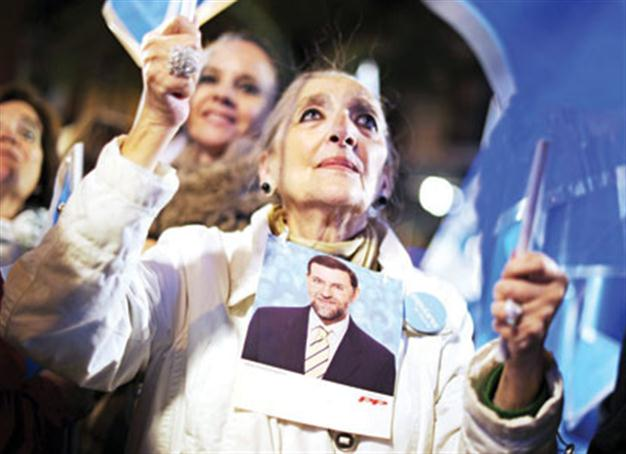Crisis ousts another EU gov’t
MADRID - Reuters

A supporter holds opposition Popular Party (PP) flags in Madrid on Nov 20. Spain is to become the fifth eurozone country to have changed governments due to the debt crisis. AFP photo
Spain’s conservative People’s Party triumphs in Sunday’s general election, as voters punish the governing Socialists for the ongoing debt crisis.Spanish Prime Minister-elect Mariano Rajoy was under pressure yesterday to give rapid details of his policies to overcome the worst economic crisis for generations as his overwhelming election victory did little to calm the nerves of investors.
Rajoy’s conservative People’s Party (PP) notched up the biggest election victory in 30 years on Sunday, with angry voters savaging the outgoing Socialists for a crisis that has pushed unemployment to more than 20 percent, the highest in the European Union.
The Socialists were the fifth eurozone government to be toppled by a debt crisis that now seems out of the control of vulnerable individual countries.
But with little real detail on Rajoy’s plans, the spread between yields on Spanish government bonds and safe haven German bunds widened yesterday morning by 20 basis points to 4.63 percentage points. Ten-year yields were higher, at 6.57 percent, creeping closer to the perilous 7 percent level that forced countries like Greece and Portugal to seek bailouts.
Under Spain’s long transition process, Rajoy will not take power until around Dec. 20 but he will have little time to bask in the huge victory for his People’s Party.
There is pressure for him to calm jittery markets with some word on what are expected to be deep and painful austerity measures. Since his victory he has only said that there will be no miracles to fix the crisis.
Spaniards are resigned to a battery of measures to resuscitate the economy that could make things worse before they get better and at least initially increase unemployment, with 5 million people already out of work.
Rajoy has so far pointed to labor market and a financial reform as well as sweeping changes in the public sector, but has not given clear policy lines , relying instead on voter anger against the Socialists to propel him into power.
Peter Goves, an interest rate strategist at Citigroup, said markets were waiting to see Rajoy’s fiscal plans although he said the real solution to the eurozone crisis lay outside Spain.
“Arguably, this won’t make a lot of difference to the eurozone problems. It might influence Spanish spreads but the wider systemic issues will have to solved at a euro zone head level,” he said.
Crippling housing bust
Spaniards blame the Socialists for reacting too late to manage a collapsed housing boom which has left the nation sliding towards its seco nd recession in two years .
“There will be no miracles, we haven’t promised them, but we have seen in other times that when things are done well, they produce results, “ Rajoy, 56, told supporters in his victory speech Sunday night. “Spain’s voice must be respected again in Brussels and Frankfurt... We will stop being part of the problem and will be part of the solution.”
PP won the biggest majority for any party in three decades. It took 186 seats in the 350-seat lower house, according to official results. The Socialists slumped to 111 seats from 169 in the outgoing parliament, their worst showing in 30 years.
Rajoy, a former interior minister, is seen as market friendly and pro-business. The Spanish Treasury is heading back to the markets with debt auctions today and Nov. 24 this week, the first key tests of confidence in Rajoy’s leadership.
Meanwhile, the “United Left,” which includes the former communist party, won 11 seats in the lower house, its best showing since the mid-1990s and way up from the previous legislature when it had only two seats. Small parties doubled their presence in the lower house of parliament, taking 54 seats compared with 26 in the last legislature
















